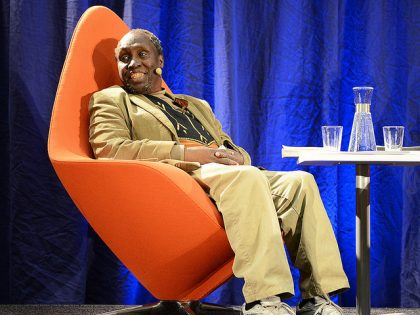The pitfalls of symbolic decolonization
Mukoma wa Ngugi's opening remarks at the launch (today) of the 2020 Writers Unlimited International Literature Festival in The Hague.

Slave holding room, Elmina Castle, Ghana. Image credit Kevin Thai via Flickr CC.
In January of 2019, I traveled to Ghana to visit slave castles and forts for the book I am currently writing on the relationship between Africans and Black Americans, Somewhere between Black and African: A Biography of my Skin. I visited Keta, a coastal town that Maya Angelou in All God’s Children Need Traveling Shoes described as melancholic—you see this was once a village from where slaves were kidnapped.
There is a question we do not ask often enough—what happened to villages and towns in Africa after slave traders started disappearing their populations? The slaves had to come from somewhere—what happened to those communities that were raided for their mothers, fathers, sisters and brothers, aunts and uncles? One of the answers is inherited psychological trauma and inherited poverty.
Conversely, what happened to the towns and cities where the slaves were brought for trade and labor? Shortly after leaving Keta, I visited Bristol, England. Bristol rises from the ocean to hills that are more like ridges. The river front where the slave boats docked is now busy with commercial ships and tourist boats. Along the waterfront all kinds of bars and bohemian like restaurants proliferate. Keta is a town wrapped in a blanket of melancholia, while in Bristol its bohemian happy excess.
To be sure, in Bristol there are attempts at remembering history and decolonization. For example, Edward Colston was a major slave trader who brought wealth to Bristol—streets and buildings are named after him. The effort to get them renamed is underway. As England tries to grapple with its own slavery legacy, in the US monuments celebrating the purveyors of slavery are being reluctantly toppled.
As an aside, in a somewhat strange move, Evanston, Illinois, the town I was born in, recently legalized marijuana—the revenue raised from taxes will go “will be used for investment into the African American community and to make amends for racial inequalities.”
Universities are also reckoning with the past. For example, debt ridden Georgetown University sold 272 slaves owned by Jesuit priests in order to stay afloat. As part of its reckoning, the university now offers free tuition to the decedents of those sold, and the students recently voted to raise their tuition by $27.20 as a form reparation. That Jesuit priests owned slaves should not come as a surprise—every slave castle I visited had a church in its own compound. In Elmina and Cape Coast the church was built directly above slave dungeons. The pious white Christians would pour water through the cracks in the wooden floor to ease the thirst and heat. If there is one institution in dire need of decolonization, it is the church.
But here is the question. Consider all the unresolved historical inequalities where slavery becomes indentured servitude as Indians are imported into British colonies, colonialism becomes neocolonialism, and neo-colonialism opens up to unequal globalization. Also consider the inherited trauma still suffered by comminutes all over the world that have been, generation after generation, at the brunt end of global exploitation. Can what we in the West are calling decolonization in philosophical and material terms, really address historical inequalities?
Or to put it differently: how does renaming the streets of Bristol speak, in real terms, to towns like Keta still reeling from slavery? Or countries like the Congo where you can draw a straight line from King Leopold, Belgium slavery and colonialism, the assassination of Patrice Lumumba, the continued exploitation of its resources and consequent wars that have left millions of people dead? What do we with these sedimented oppressions?
I am not asking for ideological purity or some dogmatic goal. If for Fanon, “the battle against colonialism does not run straight away along the lines of nationalism” decolonization cannot run along the straight lines of conscientious liberalism. That is the sort of liberalism whose sincerity is severely undermined by its insistence on being ahistorical. But there are some fundamentals, some basic truths, some basic laws of decolonization that we have to follow if we are to move from symbolic decolonization to real philosophical and material decolonization.
Symbolic decolonization is useful, but it is also useless without material decolonization. The point of decolonizing the mind has always been in the service of material decolonization, in the same way that black consciousness in South Africa was not an end in itself but a necessary step in the struggle against apartheid.
Therefore, yes, let us decolonize the universities but let us also make sure that they are paying their fair share of taxes in the towns and countries they are in. Rename the streets, but also struggle for economic justice—that means calling for redistribution of wealth.
Steve Biko when asked about a post-Apartheid future argued that ‘[t]here is no running away from the fact that now in South Africa there is such an ill distribution of wealth that any form of political freedom which does not touch on the proper distribution of wealth will be meaningless.” Decolonization that does not address economic inequality will be meaningless.
We should also acknowledge that decolonization in the West does not work unless it addresses African towns and peoples that still suffer from the effects of slavery/colonization and unequal globalization.
All in all, decolonization should as a matter of principle be in the service of ending exploitation and its legacies.
In short, decolonization achieves nothing unless it is first and foremost a revolutionary act.



